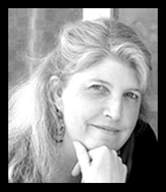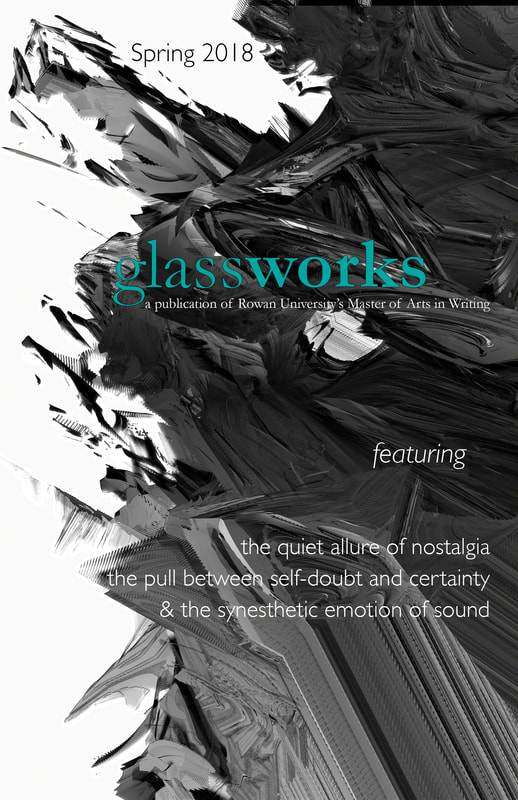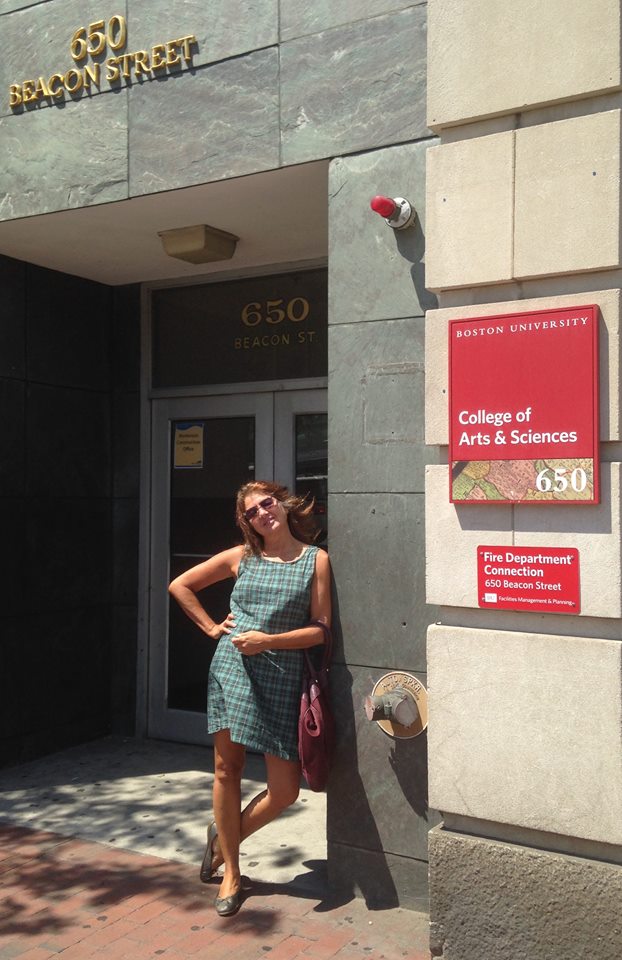|
lookingglass
Through the "Looking Glass," readers are invited to dig deeper into our issues as contributors share reflections on their work. Specifically, "Looking Glass" provides a sort of parlor where authors and artists reveal the genesis of their pieces, as well as provide meta-discursive insight into their textual and visual creative works. Issue 16 Reflections
Read on for reflections by select authors and artists
on the genesis and craft of their pieces in Glassworks and then read the full issue online! |
Kaila Lancaster
"When the World Goes Dark"
|
It started with a conversation with my mom over the phone and a deadline for a point of view class in my first semester of my MFA. The assignment: write something in third person limited POV.
I had no idea what to write about. This class was rapid-fire, and we essentially had to have short drafts done each week, all fresh pieces written exclusively for the class. I did what any writer with writer’s block would do: I called my mom for our nightly chat to brainstorm and to procrastinate. I brainstormed aloud in between catching up, in between discussing the latest episode of ABC’s The Middle, our favorite show. I rattled off ideas, took notes as I thought of possible plots, characters, etc. Mom was helpful. “That sounds good,” she said. Or, “Oh! That one too, I like that.” My mom’s the best. The conversation drifted toward the [depressing] news program my mom was watching, and then she casually suggested that I stock up on water bottles and purchase a high-tech flashlight. Just in case. |
An idea emerged.
After a obtaining permission to loosely base my story off of the conversation, I began writing and turned in my draft to the class the following week. It was a particularly busy week of grad school, so writing was done in between tutoring sessions at the writing center, in a bustling student union, on my sofa cuddled next to my dog, Ellie, after reading composition pedagogy theory, and late at night right before printing copies for my workshop. As I was writing, I immediately felt connected to the characters; I felt totally immersed in their world, and it was one of the first pieces I was actually proud to turn in.
After workshop, the draft inevitably underwent major changes thanks to the helpful observations and suggestions of classmates and the professor—characters were cut, scenes expanded, scenes thrown out, the ending completely changed, prose refined. I spent a month or so revising and refining, and then I had a story I was pretty proud of.
The final story explores a mother-daughter relationship and how the two women approach/deal with the scary possibilities of their world. I hope readers enjoy following Paris and Mother’s story and enjoy discovering the complexities existing in this relationship.
Like mother like daughter, and, like my mother, I always have a case of bottled water in my storage closet. Just in case.
After a obtaining permission to loosely base my story off of the conversation, I began writing and turned in my draft to the class the following week. It was a particularly busy week of grad school, so writing was done in between tutoring sessions at the writing center, in a bustling student union, on my sofa cuddled next to my dog, Ellie, after reading composition pedagogy theory, and late at night right before printing copies for my workshop. As I was writing, I immediately felt connected to the characters; I felt totally immersed in their world, and it was one of the first pieces I was actually proud to turn in.
After workshop, the draft inevitably underwent major changes thanks to the helpful observations and suggestions of classmates and the professor—characters were cut, scenes expanded, scenes thrown out, the ending completely changed, prose refined. I spent a month or so revising and refining, and then I had a story I was pretty proud of.
The final story explores a mother-daughter relationship and how the two women approach/deal with the scary possibilities of their world. I hope readers enjoy following Paris and Mother’s story and enjoy discovering the complexities existing in this relationship.
Like mother like daughter, and, like my mother, I always have a case of bottled water in my storage closet. Just in case.
Suzi Ehtesham-Zadeh
"Jungle of Stars"
|
I came into fiction writing rather late in life, although in hindsight I realize I was evolving toward it all along. I was the consummate diary keeper as a child, and during my adolescent years my diaries morphed into more serious journals I kept hidden in my nightstand. At some point I graduated from petty comments about my friends and family members to observations about strangers and philosophical musings about human nature in general. Although I didn’t always use these notes for anything concrete, they served as vigorous exercise for the fiction writer part of my brain.
One of the greatest gifts I received as a writer was an accident of my birth: I am the product of a mixed marriage between an Iranian physician and an American schoolteacher, and I grew up in a bicultural, bilingual household in pre-Revolutionary Tehran. My early glimpses of American life came from Armed Forces Television broadcasts. I watched reruns of “Bonanza” and “I Love Lucy” with a view of Mt. Damavand out my window, the sound of donkeys braying in the distance, and the odors of fenugreek and saffron wafting in from the kitchen. On the weekends my erudite, opium-smoking grandfather recited the poetry of Hafez and Rumi from memory and expounded upon Sufi philosophy. Although the culture straddling was bewildering at times, it was a privileged upbringing, and one that formed deep wells of inspiration. When my father died a little over a decade ago, it seemed to me that all of Iran would die with him if I didn’t find a way to immortalize it. I began to devote more of my time to writing. The yield thus far has been a novel and a collection of stories, all of them centered around the lives of Iranians and Iranian-Americans. |
“Jungle of Stars” was inspired by a visit to Iran during which I witnessed the popular uprisings of the ill-fated “Green Movement”. The young woman who yanks off her headscarf in the story is loosely based on Neda Agha-Soltan, whose shooting death during street protests is still shrouded in mystery. The story is set in 2009, but its dynamics are ongoing: the underground women’s movement in Iran is alive and well, the Iranian people are still fighting against corruption in their government, and, alas, addiction and apathy are still real obstacles in the fight for justice.
The story does have a positive upswing in the end, and this, of course, is deliberate. It is my hope that “Jungle of Stars” will provide a counterweight to the fear-mongering and hate-mongering that have defined the popular view of Iran and Iranians for decades, and that it will open a much-needed window into a part of the world that is both underrepresented and misrepresented.
The story does have a positive upswing in the end, and this, of course, is deliberate. It is my hope that “Jungle of Stars” will provide a counterweight to the fear-mongering and hate-mongering that have defined the popular view of Iran and Iranians for decades, and that it will open a much-needed window into a part of the world that is both underrepresented and misrepresented.
Sharon H. Smith

I don’t always write about grief, but when losses happen as they do more and more as we age, I find writing is a way I can process my feelings, and also I have time with my loved ones again. These two poems reflect two different losses I experienced.
When I write poems like these, I feel I am also paying tribute to my beloveds.
When I write poems like these, I feel I am also paying tribute to my beloveds.
"Grandfather Clock"
"Grandfather Clock" was the last chapter after a long journey of losing my father, which is the story in prose and poetry, in my upcoming chapbook entitled Held: A Father Lost and Found.
When my stepmother passed away, ten years after losing my dad, we siblings sold the house. Eventually the house was empty except for the clock. It was treasured by my father. We couldn’t just give it away. Did I really need a big piece of furniture at this time of my life? Like the journey of losing my dad, deciding and obtaining the clock became its own saga. It was another six months before it was restored and brought to my house. As reflected in this poem, the process added another layer to the loss. It is finally here, and looks like it has always been. It is tall like my dad. He would be so pleased. |
"Losing Skip"
"Losing Skip" is another story of loss. There is reference to this wonderful man, Don “Skip” Skipworth, in the book about my dad. He was a dear friend, and a rock when my dad went missing. He was jolly, looked just liked Santa Claus, and actually played him in the Santa Monica Christmas parade. Skip was also an amazing cook focused on Asian cooking. We shared that love and put on some events together. He was a good friend of Julia Child. The cat reference in the poem is her cat, Minette. When she passed, he was given the cat and her famous cleaver. I was at his house soon after he died and I was taken by the feeling that he was going to be missed by more than me, and other friends. I had the feeling that everything in his beautiful Asian house and bamboo garden, the beauty he created, including the cat, was going to miss him.
|
J.G. McClure
"Pool"
This poem is a translation of Irene Gómez-Castellano’s “Piscina,” from her collection Natación, which I’m at work translating into English (Swimming). I met Irene seven or eight years ago, when I was an undergrad in her Spanish-language poetry class, one of those sweeping surveys spanning multiple centuries and countries. At the time, I was just realizing I wanted to pursue a life in poetry. Outside of the class I was working on a translation of Neruda, trying to understand and internalize what I loved about his “Walking Around,” and I gained much from Irene’s encouragement and insights. Later she invited me to give a brief paper on Martí to one of her grad classes; I became her assistant on various academic projects; and after I left for grad school we still exchanged occasional emails as I sought her advice on translations I was working on there.
In all this time, she never mentioned that she was herself a poet, though looking back I should have guessed—it’s clear to me now that she brought a poet’s eye to all the poems we studied, a mix of scholarly rigor and intensely personal engagement to which I aspire. Still, I had no idea until I came across one of her poems quite by accident. I reached out to her about it, and we began collaborating on the translations.
Translating poetry is a tricky thing, and there’s a huge body of theoretical and critical work surrounding it. I won’t go into all that, but suffice to say, as Robert Bly puts it in “The Eight Stages of Translation,” that even “the best translation resembles a Persian rug seen from the back—the pattern is apparent, but not much more.” A poem in translation can never exactly reproduce all of the effects of the original, and it shouldn’t try—the translator’s first and last loyalty must always be to making a good poem in the target language. Again to quote Bly: "Leaving the word order of the original poem behind is often painful; beginning translators especially resist it. They feel disloyal if they move the verb, but each language evolves in a different way and we cannot cancel a thousand years of language evolution by our will. Moreover, if we are disloyal to German, we are at the same moment loyal to English."
I don’t mean this as a form of hand-wringing about the impossibility of accurate translation. Rather, translation introduces new possibilities not available to the original poem. Lawrence Venuti has called these possibilities the “remainder,” those literary effects that can exist only in the translation and which mark the translation as a new thing, distinct from the original.
So where necessary, I’ve felt free to alter word order, line breaks, and so on to suit the needs of the poem in English. At the same time, it’s important to keep in mind that, as Sherry Simon puts it in her “Taking Gendered Positions in Translation Theory,” good translation “implies extending and developing the intention of the original text, not deforming it.”
That’s the sort of translation I’ve aimed for with Natación/Swimming. So much of what I know about poetry I learned from Irene, and it’s been a wonderful experience to be able to engage with her work in this way, and to collaborate with her as I try to bring these poems into English, to stay faithful to their meanings and their spirit while remembering that translation is always, at its heart, alteration.
In all this time, she never mentioned that she was herself a poet, though looking back I should have guessed—it’s clear to me now that she brought a poet’s eye to all the poems we studied, a mix of scholarly rigor and intensely personal engagement to which I aspire. Still, I had no idea until I came across one of her poems quite by accident. I reached out to her about it, and we began collaborating on the translations.
Translating poetry is a tricky thing, and there’s a huge body of theoretical and critical work surrounding it. I won’t go into all that, but suffice to say, as Robert Bly puts it in “The Eight Stages of Translation,” that even “the best translation resembles a Persian rug seen from the back—the pattern is apparent, but not much more.” A poem in translation can never exactly reproduce all of the effects of the original, and it shouldn’t try—the translator’s first and last loyalty must always be to making a good poem in the target language. Again to quote Bly: "Leaving the word order of the original poem behind is often painful; beginning translators especially resist it. They feel disloyal if they move the verb, but each language evolves in a different way and we cannot cancel a thousand years of language evolution by our will. Moreover, if we are disloyal to German, we are at the same moment loyal to English."
I don’t mean this as a form of hand-wringing about the impossibility of accurate translation. Rather, translation introduces new possibilities not available to the original poem. Lawrence Venuti has called these possibilities the “remainder,” those literary effects that can exist only in the translation and which mark the translation as a new thing, distinct from the original.
So where necessary, I’ve felt free to alter word order, line breaks, and so on to suit the needs of the poem in English. At the same time, it’s important to keep in mind that, as Sherry Simon puts it in her “Taking Gendered Positions in Translation Theory,” good translation “implies extending and developing the intention of the original text, not deforming it.”
That’s the sort of translation I’ve aimed for with Natación/Swimming. So much of what I know about poetry I learned from Irene, and it’s been a wonderful experience to be able to engage with her work in this way, and to collaborate with her as I try to bring these poems into English, to stay faithful to their meanings and their spirit while remembering that translation is always, at its heart, alteration.
Elizabeth M. Dalton
"Ripe"

“Ripe” is part of a collection of essays about my relationship with my sister, Molly, who died in 1997. The collection, Burying Molly, is a rumination on sisterhood, including the challenges and joys of girls growing up in the rural Midwest. More importantly, it is a memorial to a beloved sister, whose courage surfaced during those last terrible months of her life, when as a young expectant mother she learned she was dying of cancer.
My inspiration for this creative nonfiction essay came from an assemblage of memories from our childhood. Picking tomatoes was a yearly chore we both dreaded. The insistent bugs, the Indiana heat and humidity, and the looming school year coalesced into a miasma we slogged through on our way to the end-of-season garden. Then at some point during our labors we would look down at the tomatoes in our bags and in our hands and remember that they were delicious. We always ended up sitting at the edge of the garden with tomato juice running down our chins. One of these moments is juxtaposed with my memories of my sister’s wedding day. We had become our adult selves by that time, filled with expectations and a shared sense of history. We ourselves had ripened and autumn was upon us.
My inspiration for this creative nonfiction essay came from an assemblage of memories from our childhood. Picking tomatoes was a yearly chore we both dreaded. The insistent bugs, the Indiana heat and humidity, and the looming school year coalesced into a miasma we slogged through on our way to the end-of-season garden. Then at some point during our labors we would look down at the tomatoes in our bags and in our hands and remember that they were delicious. We always ended up sitting at the edge of the garden with tomato juice running down our chins. One of these moments is juxtaposed with my memories of my sister’s wedding day. We had become our adult selves by that time, filled with expectations and a shared sense of history. We ourselves had ripened and autumn was upon us.




